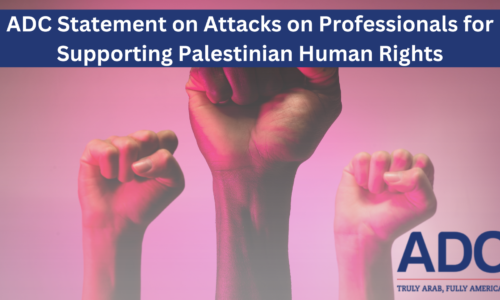Washington, D.C. | October 27, 2023 – The American-Arab Anti-Discrimination Committee (ADC) unequivocally condemns the persistent attacks on professionals for their support of Palestinian human rights and self-determination. Such attacks have long been attempts to stifle any form of criticism of Israel’s occupation and apartheid.
The ADC stands firmly with professionals who have been unfairly targeted for their stances, resulting in employment repercussions or business losses. We are here to offer our support and resources. If you or someone you know has been affected, please do not hesitate to reach out to us at [email protected]. Together, we can strive for a world where voicing support for human rights does not come at the cost of one’s livelihood or reputation.
It is not lost on us that many defenders of Israel are more concerned about personal social media comments than statements from figures in authority.
Israel’s defense minister has referred to Palestinians as “human animals.” An Israeli major general threatened that “there will be no electricity and no water, there will be only destruction.” Sen. Lindsey Graham stated that Israel should “level the place.” Alarmingly, Biden’s State Department released a memo informing diplomats against using the phrase “an end to violence.” Furthermore, Biden’s press secretary went as far as to label members of Congress who advocated for a ceasefire as “repugnant and disgraceful,” claiming “there are not two sides” to the issue.
If the true concern were human lives, energies would be better focused on those wielding power who either endorse or perpetrate the collective punishment of over two million Gazans, of whom half are children.
However, the actions of these smear campaigns reveal their real intent: to silence any critics of Israel, irrespective of the severity of Israel’s actions. This is not about purported support for violence. Advocates for the rights of Palestinians have consistently promoted non-violent approaches, such as boycotts, to urge Israel to end over half a century of brutal military occupation. Yet, in doing so, they are unjustly labeled as antisemitic and blacklisted.
Human emotions are complex, and rage at injustices, especially those rooted in personal histories and collective trauma, is entirely understandable. Would the same critics be as swift to judge Israelis for expressing their raw emotions?
Rather than resorting to slander and threats, we believe the way forward lies in fostering understanding and building bridges.

